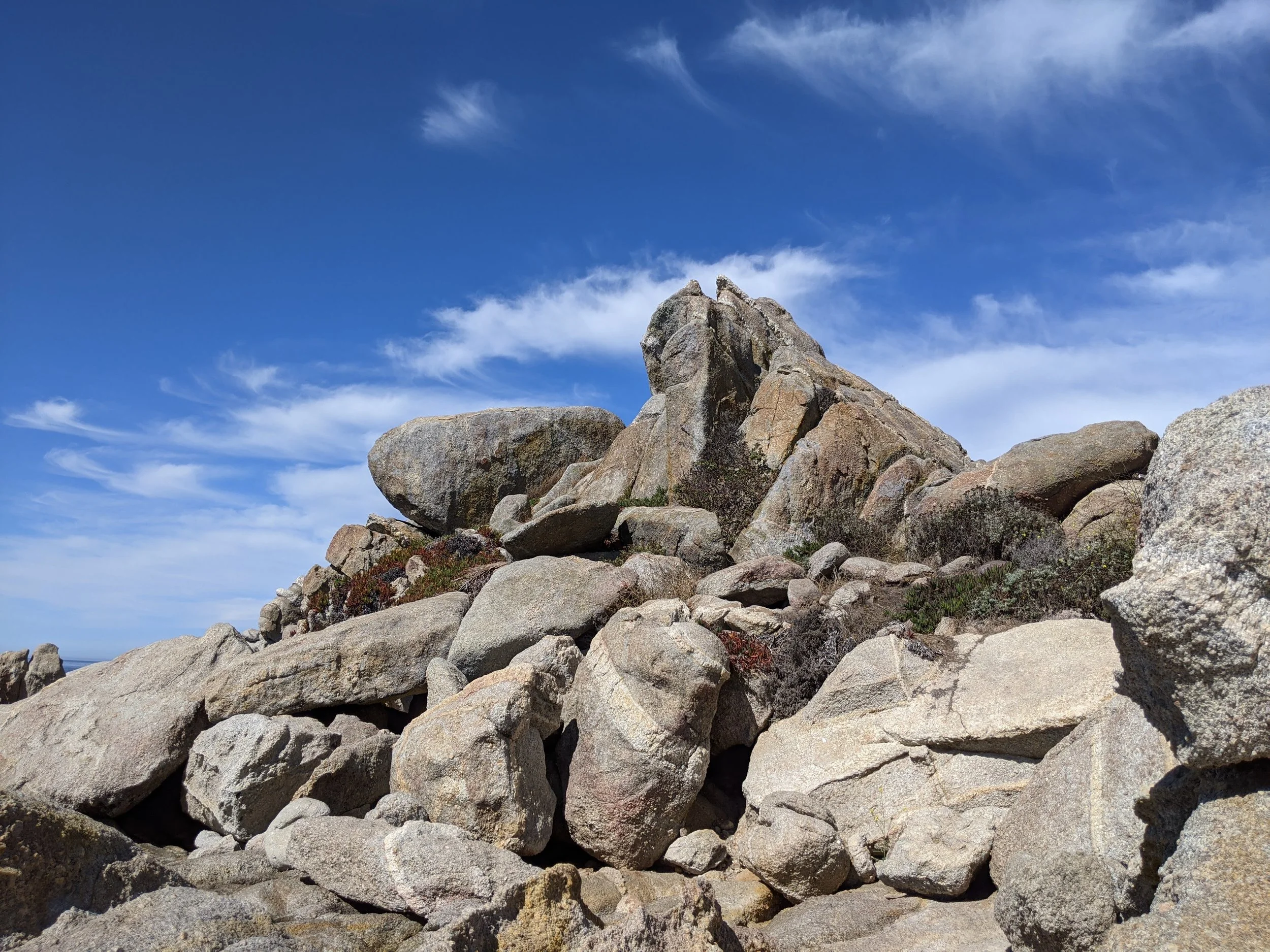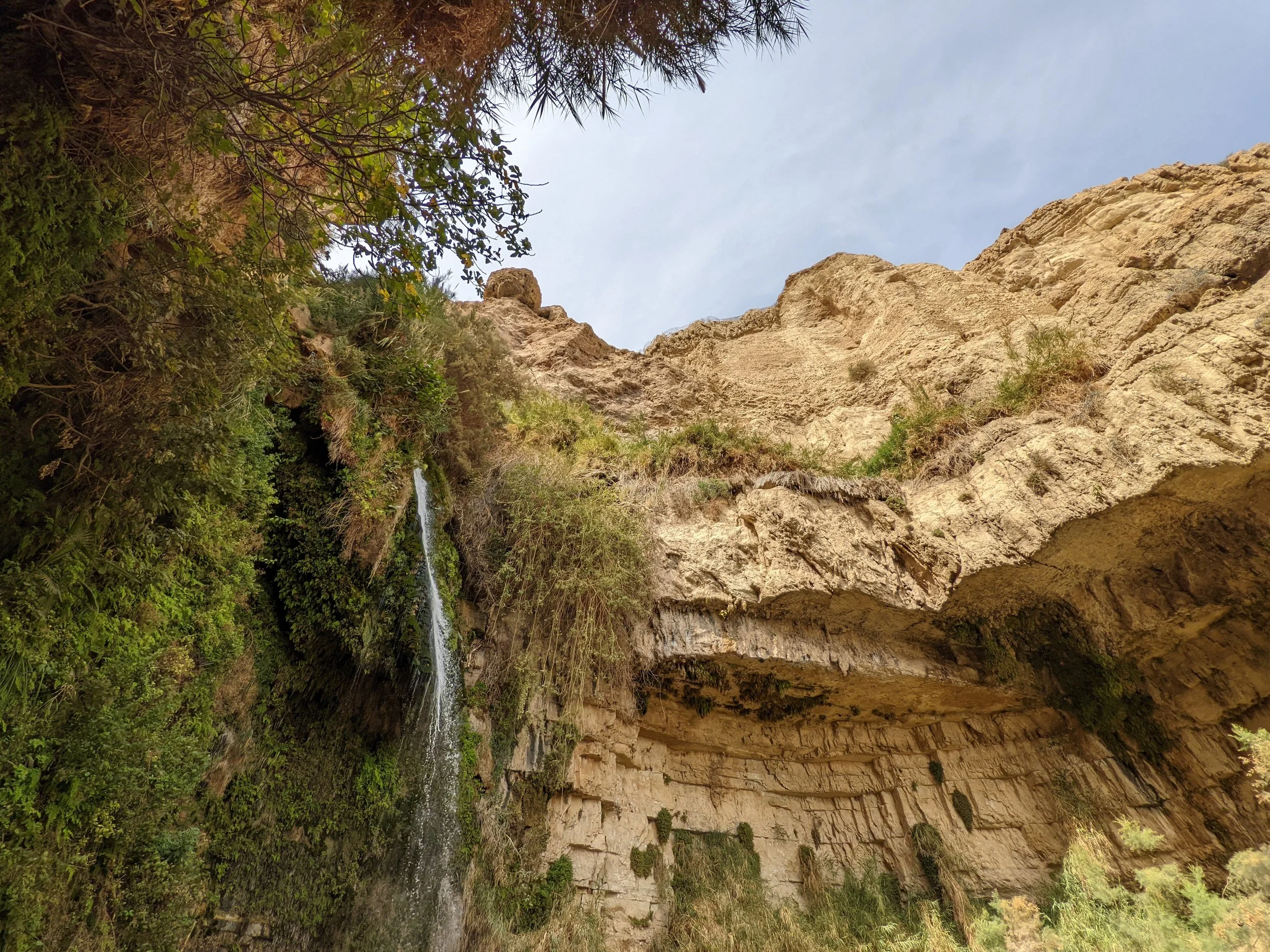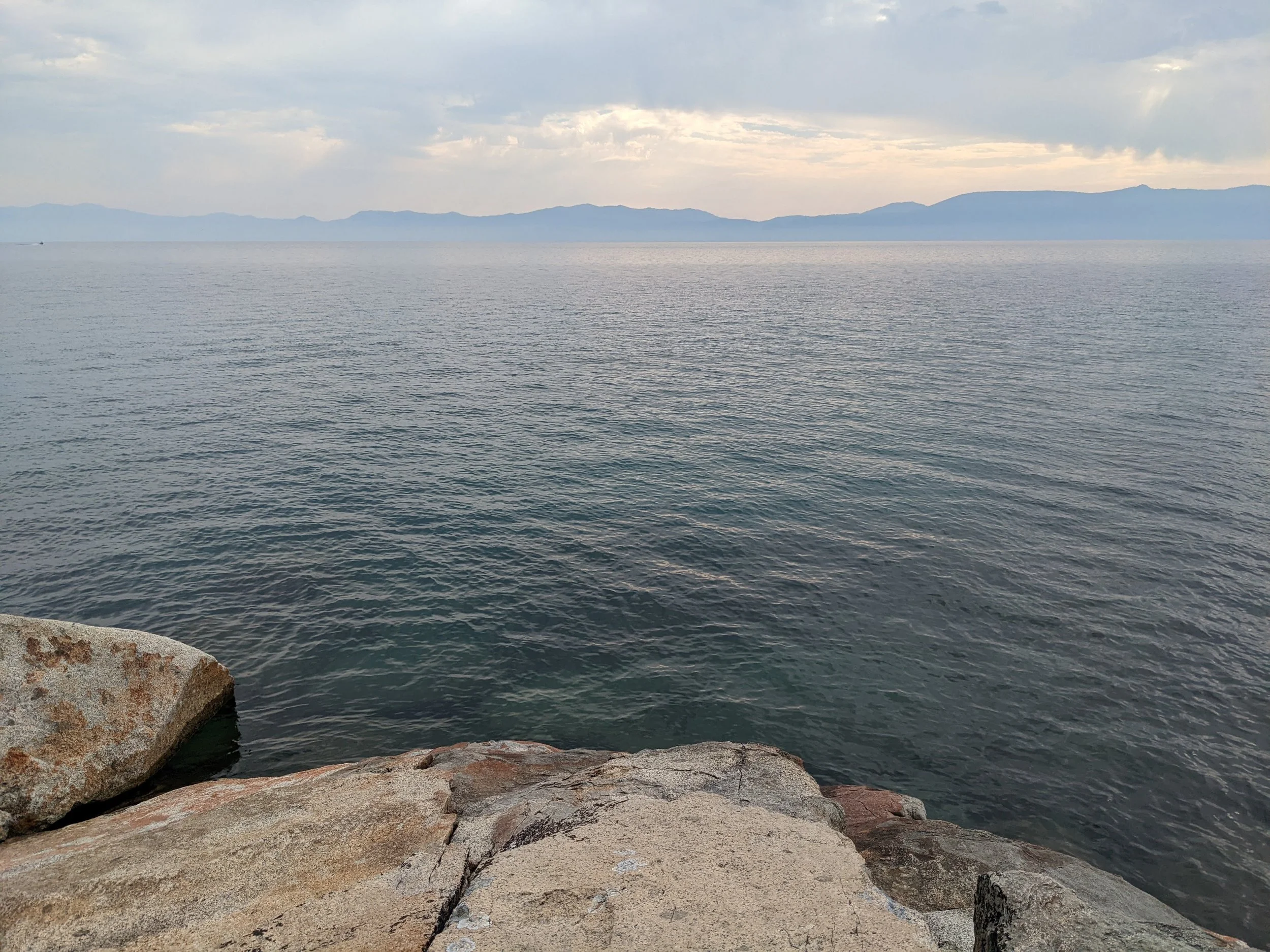33 Now many saw them going and recognized them, and they ran there on foot from all the towns and got there ahead of them. 34 When he went ashore he saw a great crowd, and he had compassion on them, because they were like sheep without a shepherd. And he began to teach them many things. 35 And when it grew late, his disciples came to him and said, "This is a desolate place, and the hour is now late. 36 Send them away to go into the surrounding countryside and villages and buy themselves something to eat." 37 But he answered them, "You give them something to eat." And they said to him, "Shall we go and buy two hundred denarii worth of bread and give it to them to eat?" 38 And he said to them, "How many loaves do you have? Go and see." And when they had found out, they said, "Five, and two fish." 39 Then he commanded them all to sit down in groups on the green grass. 40 So they sat down in groups, by hundreds and by fifties. 41 And taking the five loaves and the two fish, he looked up to heaven and said a blessing and broke the loaves and gave them to the disciples to set before the people. And he divided the two fish among them all. 42 And they all ate and were satisfied. 43 And they took up twelve baskets full of broken pieces and of the fish. 44 And those who ate the loaves were five thousand men. — Mark 6:33-44
Put Yourself There
Imagine being there. Put yourself in the scene. Imagine wishing so badly to see Jesus that, when you heard that was his boat out on the water, and when you saw the winds slow his journey, you stopped everything and ran to his destination ahead of him.
He arrived. He began teaching and, as the other gospels record, healing. The hours ticked by, and the crowd grew. You, and thousands of others, had left everything for the chance to see Jesus. And now, without food, your hunger has grown.
Then word began to spread through the throngs of people—Jesus wants us all to sit down in groups on the green grass. There you are, waiting, when, from afar, you see him take up something in his hands and lift it to heaven. Quiet strikes the crowd. Straining, you make it out: he is blessing God, thanking him for the food in his hands. And now he's filling baskets for his twelve disciples—but what is he putting in those baskets?
Your question is answered when one of his men arrives at your group. The basket is filled with little loaves of bread and smoked fish, enough for everyone in your group to glut themselves. It has been years since you've been full, and some in your group have never eaten so much in their lives.
As you watch each of Jesus' men, you notice them returning to Jesus again and again. And he is filling their baskets. But he has no supplies with him, no reserves of bread or fish.
Then it strikes you. Jesus has just created food in his bare hands! Like God, who dropped the miracle of daily manna upon ancient Israel, so Jesus has miraculously provided food for the masses!
Centuries earlier, God had told Moses he would one day send a Prophet like Moses to the people (Deuteronomy 18:15). And, as John's gospel records, people around you begin concluding Jesus was that Prophet. Moses had led the people from their Egyptian oppressors, and now Jesus could lead them in victory against Rome's occupation. Moses had prayed, and God provided manna, and now Jesus could provide food out of thin air. Your group considered what this all meant, and, as John records, a consensus developed—Jesus must become king!
But before you have a chance to act on the impulse, he is gone, off to the mountain for solitude and prayer. And you are left, full and satisfied, rocked by Jesus.
The Message
I wanted you to get inside this story because it is too easy to trivialize this event, making it into a cute miracle in Jesus' repertoire. Instead, it seems we should see this event as monumental. This is the only miracle during Jesus' ministry before the cross that all four gospel writers record. To them, it was significant.
But why? Is it because of the sheer magnitude of what Jesus did? There must be something more.
The clue is found in the introductory verses: "When he went ashore he saw a great crowd, and he had compassion on them, because they were like sheep without a shepherd. And he began to teach them many things" (Mark 6:34).
Combined with John's recollection of the people's desire to make Jesus into their king, it becomes obvious there is something more at play here. When we see Jesus' compassion, and his concern that they were like sheep without a shepherd, we tend to think of his pastoral care and concern (34). We think of things like his love, his tenderness, and his gentle nurturing of our lives.
But they saw shepherds differently. To them, the shepherd role was a leadership role. And when used as a metaphor for Israel, the shepherd role often pointed to a military leader, like Moses or Joshua, who would rally Israel for war. Without the shepherd, the flock was aimless and visionless. The shepherd was the one who provided a cause and mission and led them into it by providing direction in battle.
So, from this passage, how does Jesus shepherd his people? How does he shepherd you?
1. By Strengthening You (Mark 6:35-38)
The Disciples' Assessment
We remember, of course, how Jesus has recently turned his attention to the development of his disciples. He has sent them out two by two. They have returned to him. They needed to eventually become apostles, sent out into the world with Jesus' message. Like military officers following orders on the battlefield, Jesus fed the crowds through the direction he gave to his men. But before the miraculous feeding, the disciples confronted Jesus.
In their minds, since it was so late in the day, and since they were in a desolate place on the outskirts of town, Jesus needed to send the crowds away to go into the surrounding countryside and villages and buy themselves something to eat (35-36). Don't belittle them for their suggestion. They could not possibly have dreamt of what Jesus would do next.
Jesus Was Strengthening These Men
Jesus then challenged his men to take care of the people's needs on their own. "You give them something to eat," he said (37). They were shocked. Their quick calculations told them it would take eight months of wages to feed such a large crowd just one meal. When they delivered their logic to Jesus, he told them to find out how many loaves they had. Five...and two fish.
What was Jesus doing? Shepherding, of course. And, here, he was shepherding by strengthening his disciples. He knew they needed to be stronger if they were going to engage in his mission, and this event would help grow them in important ways.
And Jesus works hard to strengthen us. In this passage, we see three ways Jesus strengthened his men, and also strengthens us.
A. He Showed Them People's True Need
The disciples had just returned from a very successful time of preaching, healing, and confronting demonic powers. They were amazed at their newfound ability.
But, just like that, they were confronted with their own inability. They didn't even have time to rejoice about all they'd done before they faced a situation they could not handle. The multitudes ran to the shore where Jesus would arrive. They needed Jesus, not the disciples.
And the same is true for us. We must know how to give people more of Jesus. He is the one they need. Not us, but him.
B. He Taught Them Compassion
Jesus also teaches us that compassion for the lost masses of humanity is important. Remember, he and the disciples were out on that water for a getaway, a time of leisure, and refreshment in a desolate place. These crowds ruined that intention. But Jesus was not angry or bitter at the crowds, and instead showed them compassion.
We also must be compassionate to the lost and searching crowds of this world. People are hurting, usually confused, and in need of Christ, whether they know it or not. This should elicit compassion from within us.
C. He Made Them Dependent
I have always loved this story for what it taught the disciples—and teaches us—about living in dependence upon Christ. He told them to consider their resources—five loaves and two fish. He told them to bring it to him. And then he multiplied what they had to feed the entire crowd.
You see, we don't have what it takes to get the impossible tasks in front of us accomplished. We have small resources and little ability to make any real difference on our own. But Christ can strengthen us. I can't tell you how many times I have prayed, Lord, take what I have, my five loaves and two fish, and let it be enough. It isn't enough, but with you, it can be. This is dependence.
2. By Satisfying You (Mark 6:39-44)
Creation Miracle
This is a creation miracle, meaning Jesus expressed his power over the created order. It is similar to when he calmed the wind and the wave but has the added element of creation. He is not only powerful over creation—we learned that when he calmed the storm—but he is powerful to create. In his hands, bread and fish materialized!
Mark has told us that Jesus is the Son of God. And, now, in this miracle, we see his deity. He is doing divine stuff.
Satisfied
And this story shows us Jesus' kingdom is one of total satisfaction because they all ate and were satisfied (42). It means they were glutted. Stuffed. This is sweatpants language.
And there was enough for everyone. More than enough, in fact. The twelve disciples took up twelve big baskets full of leftovers.
Five thousand men were satisfied that day. Every gospel account records the number. It's a number that doesn't include the women and children who were there (Matthew 14:21). It was a massive amount of people, a massive amount of food.
Kingdom Breaking In
And, remember, Mark is thinking about the kingdom. This miracle was meant to show the breaking in of the kingdom. In Jesus' kingdom, we are supplied. In Jesus' kingdom, we are satisfied. How so?
First, notice how Jesus fed the people with teaching. Before giving them food, he gave them the word.
Man shall not live by bread alone, but by every word that comes from the mouth of God (Deuteronomy 8:3).
When Jesus saw the multitudes, he was moved with compassion for them, and he taught them.
You see, Jesus' kingdom is the one with the truth. His truth can lead you to become satisfied with him under any condition life throws at you.
Second, notice how Jesus fed the people with bread and fish. His kingdom does not stop with the theoretical but gets into the practical.
All this is an inbreaking of the kingdom. One day Jesus will return. His truth will be there, but so will his radical provision. He will displace all the power structures of our day, replace all the earthly rulers of our time, and become the supreme yet benevolent leader of his people. And, there, every spiritual, emotional, financial, and practical need of ours will be met. Beyond met—abundance will be ours!
The Great Banquet
The feeding of the five thousand is a foreshadowing of the great final banquet, the marriage supper of the Lamb (Revelation 19). In glory, we will partake of his table without end.
It is a far greater banquet than the one the powers of the day offer. Remember our last episode? It was "king" Herod's birthday, and he threw himself a banquet in his honor. It was a debaucherous, riotous, and ghastly affair. But it was what the powers of Jesus' day were engaged in, the best they could offer.
But Jesus comes along and offers to supply you, provide for you, and take care of you. He wants to feed you, not take from you. His kingdom is the one we need.
3. By Leading You (Mark 6:33-34)
Earlier, I pointed out how they thought of shepherds in a less sentimental way than we do. To them, a shepherd for Israel was a warrior-leader-general for Israel.
And other elements in the story point to Jesus' work as the shepherd who wills to lead his people into his cause. When he had the people sit down on the green grass, it is reminiscent of Psalm 23's statement about the Shepherd-Lord: "he makes me lie down in green pastures" (39, Psalm 23:2). When he commanded people in groups of fifty and a hundred, it sounds like organizing the troops (39). When the disciples counted the masses, they only counted the men, which was their culture's way of doing things but is also reminiscent of an ancient army of male warriors (44). And there's also the location of this event—in the desolate hills on the northwestern shore of Galilee. Rural Galilee had become legendary for various freedom movements against the Roman Empire—groups like the Zealots—who tried guerilla tactics in their resistance of Rome. And each movement had a leader.
And there's even John's note that Jesus—upon perceiving they were about to make him king by force—dashed their hopes by fleeing to the mountain. This doesn't mean he didn't want to be their leader, but that they didn't understand his kingdom and what it is about. But Jesus very much wants to be, became, and will be, the conquering King.
All this should demonstrate that he wants to shepherd you in more than mere sentimental ways. He wants to lead you into the kingdom of God. He wants to enlist you into God's battle. And he wants to go before you into the victory of God.
War is afoot, one he won on his cross, and he longs to lead you into that victory. He wants to become your shepherd, the driving force of your life, the one you follow.
David
Do you remember David's early years? Before anyone knew of him, he shepherded his father's sheep. Once the spirit came upon him, he defended those sheep against a lion and a bear. This prepared him for the day he would meet Goliath. None of the men in Israel's army were up for warring with Goliath, but David, the Shepherd-Warrior, would lead them into victory. After his stone killed Goliath, the men of Israel ran after the Philistines in pursuit of victory.
Jesus has done the same. He has conquered our great foe on the cross, and now we are to run in the victory Christ has won. He has become our Shepherd-Warrior, our general in the mission of life.
Purpose
And it isn't because Jesus is selfish that he seeks to become the leading force of your life. No, it's his love that compels him.
You see, there are many others who will attempt to play the leading role in your life. But none of them can satisfy.
The book of Ecclesiastes demonstrates as much. Solomon, with wealth, power, and wisdom beyond compare, tried to find satisfaction outside of God. He made self-indulgence and the pursuit of pleasure his shepherd. He made intellectualism his pursuit. He made accomplishments and career his focus. He accumulated wealth, explored the arts, immersed himself in trade, and amassed all the happy experiences he could imagine. Nothing was off-limits. In the end, Solomon learned it was only in God he could find satisfaction (Ecclesiastes 12:13). It was only in God he could find his purpose.
Missions of Our Time
Many people have invented many missions in our modern time, causes that give them their reason, movements that are meant to bring them fulfillment, or experiences that deliver them from life's monotonies.
But Jesus and his kingdom beckon us. He sees humanity, as shepherdless, in need of the one, true King. He is moved with compassion when he sees us flounder in search of meaning. And he cries out:
"I am the bread of life; whoever comes to me shall not hunger, and whoever believes in me shall never thirst." (John 6:35, ESV).
Go to him. Let him be your Shepherd. Let him displace and replace all the lesser shepherds who have hijacked your life, for only in Jesus will you be satisfied.
***
For the entire Mark series, go here. Thank you.




